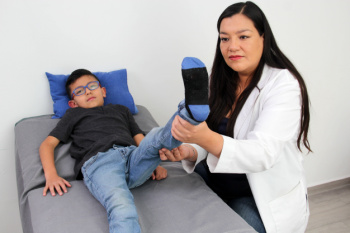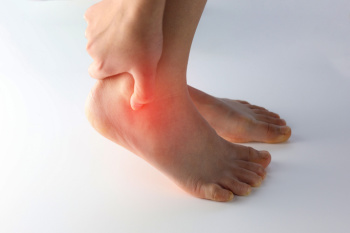Items filtered by date: May 2024
Understanding Pediatric Foot Alignment Deformities

Pediatric foot alignment deformities encompass a range of conditions affecting the structure and function of children's feet. These deformities can manifest in various forms, including flat feet, toe walking, in-toeing, and out-toeing. While some children may outgrow these issues naturally as they develop, others may require intervention to prevent potential complications. Diagnosis typically involves a thorough physical examination by a podiatrist, assessing gait patterns, foot alignment, and range of motion. In some cases, imaging studies such as X-rays may be utilized to further evaluate the condition. Treatment approaches vary depending on the specific deformity and its severity, ranging from observation and monitoring to orthotic devices, or surgical intervention in more severe cases. Early detection and intervention are essential in addressing pediatric foot alignment deformities, ensuring proper development and function of the feet as children grow and mature. If your child has been born with any type of foot deformity, it is suggested that you have a podiatrist on your healthcare team who can monitor and treat the specific condition.
The health of a child’s feet is vital to their overall well-being. If you have any questions regarding foot health, contact Dr. Tupper of Coshocton Foot Health Center. Our doctor can provide the care you need to keep you pain-free and on your feet.
Tips for Keeping Children's Feet Healthy
- Make sure their shoes fit properly
- Look for any signs of in-toeing or out-toeing
- Check to see if they have Clubfoot (condition that affects your child’s foot and ankle, twisting the heel and toes inward) which is one of the most common nonmajor birth defects.
- Lightly cover your baby’s feet (Tight covers may keep your baby from moving their feet freely, and could prevent normal development)
- Allow your toddler to go shoeless (Shoes can be restricting for a young child’s foot)
- Cut toenails straight across to avoid ingrown toenails
- Keep your child’s foot clean and dry
- Cover cuts and scrapes. Wash any scratches with soap and water and cover them with a bandage until they’ve healed.
If you have any questions, please feel free to contact our office located in Coshocton, OH . We offer the newest diagnostic and treatment technologies for all your foot care needs.
Recovering From an Ankle Sprain

An ankle sprain, though common, can be a real setback, disrupting mobility and causing discomfort. It occurs when the ligaments that support the ankle are stretched or torn, often due to sudden twisting or rolling movements. Symptoms can include pain, swelling, bruising, and difficulty bearing weight on the affected ankle. Recovery from an ankle sprain typically involves rest, compression, and elevation to reduce swelling and pain. Additionally, gradually reintroducing weight-bearing activities and performing gentle exercises to restore strength and flexibility can also help. However, recurrent sprains can indicate underlying issues like weakened ligaments or poor ankle stability. If you have sustained an ankle sprain, it is suggested that you schedule an appointment with a podiatrist for a proper diagnosis and tailored treatment plan.
Although ankle sprains are common, they aren’t always minor injuries. If you need your ankle injury looked at, contact Dr. Tupper from Coshocton Foot Health Center. Our doctor can provide the care you need to keep you pain-free and on your feet.
How Does an Ankle Sprain Occur?
Ankle sprains are the result of a tear in the ligaments within the ankle. These injuries may happen when you make a rapid shifting movement while your foot is planted. A less common way to sprain your ankle is when your ankle rolls inward while your foot turns outward.
What Are the Symptoms?
- Pain at the sight of the tear
- Bruising/Swelling
- Ankle area is tender to touch
- In severe cases, may hear/feel something tear
- Skin discoloration
Preventing a Sprain
- Wearing appropriate shoes for the occasion
- Stretching before exercises and sports
- Knowing your limits
Treatment of a Sprain
In many cases, the RICE method (Rest, Ice, Compression, and Elevate) is used to treat ankle sprains. However, you should see a podiatrist to see which treatment option would work best with your injury. In severe cases, surgery may be required.
It is important to ask your doctor about rehab options after you receive treatment for your injury. Stretching, strength training, and balance exercises may help the ankle heal while also preventing further injury.
If you have any questions, please feel free to contact our office located in Coshocton, OH . We offer the newest diagnostic and treatment technologies for all your foot care needs.
Essential Insights to Know about Gout

Gout, often termed the disease of kings, is a form of inflammatory arthritis caused by the accumulation of uric acid crystals in the joints, leading to intense pain and swelling. Contrary to popular belief, gout can affect anyone, regardless of social status or dietary habits. The condition typically manifests in sudden, severe attacks, commonly affecting the big toe. Factors contributing to gout include genetics, a diet rich in purines that are found in red meat, seafood, and alcohol, obesity, and certain medical conditions like hypertension or kidney disease. Despite its historical association with indulgence, gout is a legitimate medical concern that requires proper management and treatment. Without intervention, recurrent gout attacks can lead to joint damage and chronic pain, significantly impacting one's quality of life. If you have severe pain in your big toe and surrounding areas, it is strongly suggested that you seek advice from a podiatrist who can help you find relief and management methods.
Gout is a foot condition that requires certain treatment and care. If you are seeking treatment, contact Dr. Tupper from Coshocton Foot Health Center. Our doctor will treat your foot and ankle needs.
What Is Gout?
Gout is a type of arthritis caused by a buildup of uric acid in the bloodstream. It often develops in the foot, especially the big toe area, although it can manifest in other parts of the body as well. Gout can make walking and standing very painful and is especially common in diabetics and the obese.
People typically get gout because of a poor diet. Genetic predisposition is also a factor. The children of parents who have had gout frequently have a chance of developing it themselves.
Gout can easily be identified by redness and inflammation of the big toe and the surrounding areas of the foot. Other symptoms include extreme fatigue, joint pain, and running high fevers. Sometimes corticosteroid drugs can be prescribed to treat gout, but the best way to combat this disease is to get more exercise and eat a better diet.
If you have any questions please feel free to contact our office located in Coshocton, OH . We offer the newest diagnostic and treatment technologies for all your foot and ankle needs.
Causes and Symptoms of Tarsal Tunnel Syndrome

Tarsal tunnel syndrome is a condition caused by repeated pressure on the posterior tibial nerve near the ankle. It can lead to debilitating symptoms such as pain, numbness, or tingling sensations, often radiating into the sole of the foot or inside the ankle. This compression occurs within the tarsal tunnel, which is a narrow passageway bound by bone and soft tissue. Tarsal tunnel syndrome's origins include severely flat feet, benign bony growths, and varicose veins. Inflammation from arthritis, lesions or masses near the tibial nerve, and trauma from ankle sprains or fractures also may cause tarsal tunnel syndrome. Patients with conditions like diabetes are at further risk. Left untreated, tarsal tunnel syndrome can cause permanent and irreversible nerve damage that may affect mobility and hinder completing daily activities. If you suspect you may be experiencing symptoms of tarsal tunnel syndrome, it is suggested that you schedule an appointment with a podiatrist for a comprehensive evaluation and treatment plan.
Tarsal tunnel syndrome can be very uncomfortable to live with. If you are experiencing tarsal tunnel syndrome, contact Dr. Tupper of Coshocton Foot Health Center. Our doctor can provide the care you need to keep you pain-free and on your feet.
Tarsal Tunnel Syndrome
Tarsal tunnel syndrome, which can also be called tibial nerve dysfunction, is an uncommon condition of misfiring peripheral nerves in the foot. The tibial nerve is the peripheral nerve in the leg responsible for sensation and movement of the foot and calf muscles. In tarsal tunnel syndrome, the tibial nerve is damaged, causing problems with movement and feeling in the foot of the affected leg.
Common Cause of Tarsal Tunnel Syndrome
- Involves pressure or an injury, direct pressure on the tibial nerve for an extended period of time, sometimes caused by other body structures close by or near the knee.
- Diseases that damage nerves, including diabetes, may cause tarsal tunnel syndrome.
- At times, tarsal tunnel syndrome can appear without an obvious cause in some cases.
The Effects of Tarsal Tunnel Syndrome
- Different sensations, an afflicted person may experience pain, tingling, burning or other unusual sensations in the foot of the affected leg.
- The foot muscles, toes and ankle become weaker, and curling your toes or flexing your foot can become difficult.
- If condition worsens, infections and ulcers may develop on the foot that is experiencing the syndrome.
A physical exam of the leg can help identify the presence of tarsal tunnel syndrome. Medical tests, such as a nerve biopsy, are also used to diagnose the condition. Patients may receive physical therapy and prescriptive medication. In extreme cases, some may require surgery.
If you have any questions please feel free to contact our office located in Coshocton, OH . We offer the newest diagnostic and treatment technologies for all your foot and ankle needs.


